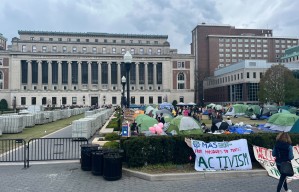Russia has banned 89 European Union politicians and military leaders from entering the country, coming in response to sanctions imposed over the country's annexations of the Crimean peninsula and alleged involvement in eastern Ukraine.
The list, revealed when Belgian MEP Mark Demesmaeker tweeted a letter from Belgian Foreign Minister Didier Reynders, includes outspoken critics of Russia, along with military intelligence officials, according to the Agence France-Presse. The letter was confirmed as authentic by the Dutch foreign ministry, which noted that Moscow had asked for the list not to be made public.
"We feel that our policy aimed at protecting the personal information of those on the list of those barred from entering Russia is better than that of our Western partners of shouting names from the rooftops," Russian news agencies quoted Russian deputy foreign minister Alexei Meshkov as saying, AFP reported.
Among those listed are former deputy prime minister of the United Kingdom Nick Clegg, current secretary general of the European Union council in Brussels Uwe Corsepius, former Belgian premier Guy Verhofstadt, Swedish MEP Anna Maria Corazza Bildt and former Czech foreign minister Karel Schwarzenberg. Eighteen people on the list are from Poland, which has been one of the sternest critics of Russia's policy towards Ukraine, according to Reuters.
"When I saw the other names, I found out I was in a very decent club. I consider this a reward," Schwarzenberg said, The Guardian reported.
Russia has been widely criticized for its March 2014 annexation of Crimea and its alleged involvement in eastern Ukraine, where its been accused of providing weapons and assistance to the pro-Russian rebels fighting against the Ukrainian government. Russian President Vladimir Putin adamantly denies backing the insurgency in Ukraine, where more than 6,200 have died from the fighting.
The European Union, as well as the United States, have imposed a number of economic sanctions, visa bans and asset freezes on numerous Russian citizens and organizations, so Moscow has responded by banning undesirables from traveling to Russia. A ministry official told Russian media that a similar list exists for U.S. citizens, according to Reuters.
A new law signed by Russian President Vladimir Putin on Saturday, also in response to Western sanctions, allows prosecutors to shut down foreign and international organizations operating in the country by declaring them undesirable.
Russian prosecutors can declare an organization undesirable if they are determined to threaten constitutional order, defense, security or public health.
Once given that designation, which requires approval by the Foreign Ministry, it would be illegal for undesirable groups to open offices in the country, authorities could freeze their financial transactions, and employees could be sentenced to up to six years in prison, according to CNN. Russian citizens thought to be involved with the undesirables could also be targeted.








